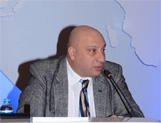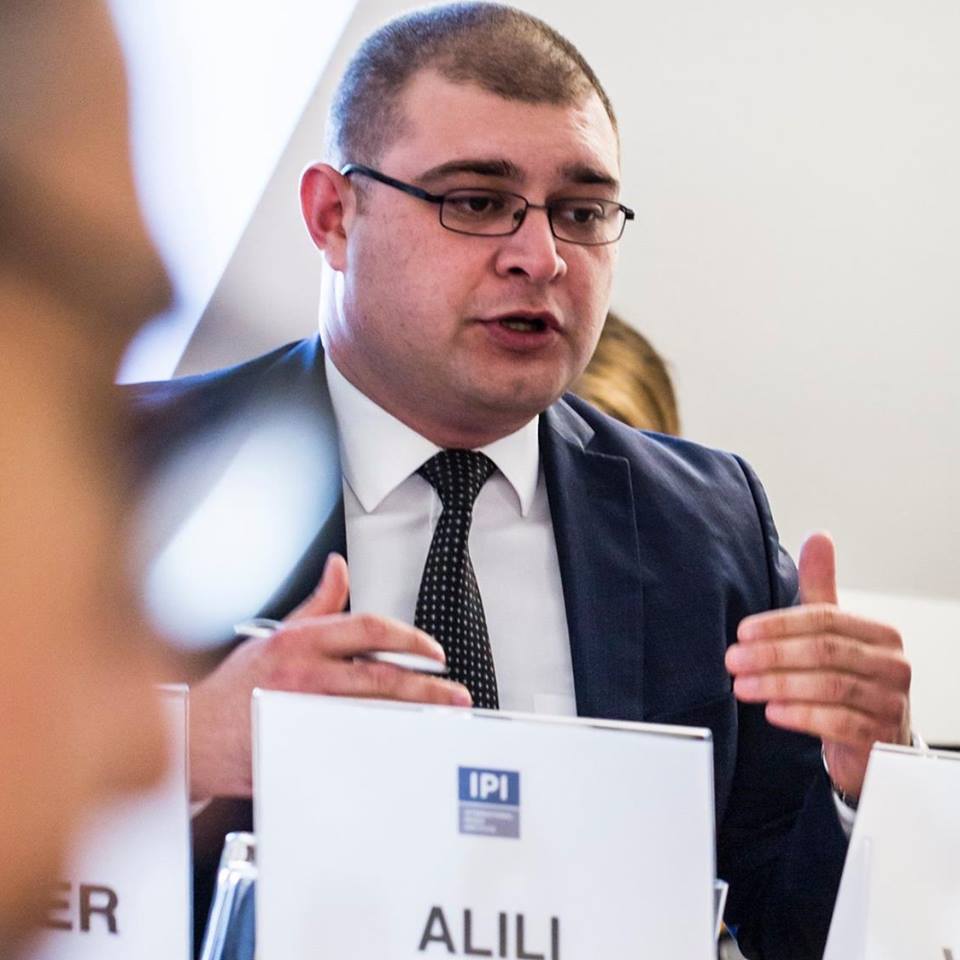
The Dangers of the "Rule-less" World  By Benyamin Poghosyan, PhD, Executive Director, Political Science Association of Armenia
By Benyamin Poghosyan, PhD, Executive Director, Political Science Association of Armenia
The United States President Donald J. Trump’s decision to recognize Israel’s sovereignty over the Golan Heights brought upon criticism and admiration from both anti- and pro-Israeli groups worldwide. However, most parts of the discussion were focused on the damages or gains of that step for the US interests in the Middle East or for competing Arab and Israeli narratives regarding the history of the Golan Heights. Meanwhile, one of the lasting implications of this decision will be the future degradation of the world order based on international norms, rules, and principles. READ MORE
- EGF Editor |
Published on EGF: 07.05.2019
| External Relations
-
THAAD in Romania: Bucharest on the Moving Sands of Great Powers’ Competition  By George Vlad Niculescu, Head of Research, the European Geopolitical Forum
By George Vlad Niculescu, Head of Research, the European Geopolitical Forum
On 11 April 2019, NATO confirmed US plans to deploy of the Terminal High Altitude Area Defense (THAAD) system to Romania. According to NATO officials, the United States will fulfil its commitment to NATO’s Ballistic Missile Defence by the temporary deployment of a THAAD system to Deveselu in Romania. The scheduled work is part of the United States European Phased Adaptive Approach to ballistic missile defence, which has been implemented since September 2009. In response, Russian Deputy Minister of Foreign Affairs Alexander Grushko said: “Russia is “closely following” the temporary deployment of a THAAD system to the Deveselu base in Romania.” READ MORE.
- EGF Editor |
Published on EGF: 02.05.2019
| Security
-
Main Challenges on the Way of European Integration of Ukraine and Georgia. Comparative Analysis  By Nika Chitadze, PhD, Director, Center for International Studies, International Black Sea University, Tbilisi
By Nika Chitadze, PhD, Director, Center for International Studies, International Black Sea University, Tbilisi
Since the first years of the restoration of independence, Georgia and Ukraine tried to establish close relations with the European Union. In the beginning of 1990’s, the European Union had already its own concrete position towards both states and considered the development of a regional partnership with post-Soviet republics as a main goal. The EU was promoting the integration of the new independent states to the international community and providing internal stability. EU’s CFSP was taking into consideration the same strategy toward all the post-soviet republics – Russia, Ukraine, as well as the South Caucasus or the Central Asian states. The purposes of EU on the way of transformation of those republics were practically similar.
READ MORE
- EGF Editor |
Published on EGF: 17.04.2019
| External Relations
-
New Caspian–Black Sea Transit Corridor Boosts Geostrategic Importance of South Caucasus  By Fuad Shahbazov, Baku-based independent regional security and defence analyst
By Fuad Shahbazov, Baku-based independent regional security and defence analyst
On March 4, Romania, Azerbaijan, Georgia and Turkmenistan held a ministerial meeting in Bucharest—the first such quadripartite gathering for these governments. During this meeting of their foreign ministers, the parties issued a joint statement reaffirming mutual respect for each other’s sovereignty, territorial integrity and inviolability of their internationally recognized borders. Additionally, a number of other important issues were raised in Bucharest, including a discussion on establishing a multimodal corridor for the transport of goods between the Black Sea and Caspian Sea basins, a project officially named the Caspian Sea–Black Sea International Transport Corridor (ITC-CSBS). READ MORE
- EGF Editor |
Published on EGF: 09.04.2019
| External Relations
-
Armenia's "Other Choices"?  By Benyamin Poghosyan, PhD, Executive Director, Political Science Association of Armenia
By Benyamin Poghosyan, PhD, Executive Director, Political Science Association of Armenia
It is time for Armenia to deepen its relations with Iran and China, out of necessity rather than choice.
Armenia continues to face a hard geopolitical reality. The 2018 Velvet revolution has brought hope of the possibility of significant and systemic changes in domestic policy - including in the fight against corruption, furthering the rule of law, and reducing monopolies over key imports and exports from and to Armenia. However, the revolution did not change the geopolitical juncture around Armenia. Yerevan continues to face joint Azerbaijani-Turkish pressure to make concessions in the Karabakh conflict settlement process. READ MORE
- EGF Editor |
Published on EGF: 01.04.2019
| External Relations
-
Historic and New Silk Road Perspectives of the European Integration of Georgia  By Nika Chitadze, PhD, Director, Center for International Studies, International Black Sea University, Tbilisi
By Nika Chitadze, PhD, Director, Center for International Studies, International Black Sea University, Tbilisi
Georgia is a small country on the crossroads of Europe and Asia. At the same time, together with the economic benefits for the country, which had and has its important geopolitical place between different civilizations, there were frequent confrontations for the gaining control over Georgia and Caucasus Region due to the fact, that modern territory of Georgia was located on one of the branch of the Great Silk Road. Historic Silk Road was functioning since 8-7-th Centuries B.C. till the middle of 15-th Century.
After the collapse of Constantinople in 1453, the interregional Silk Road lost its function, and Georgia was in a very difficult situation, that spanned centuries.
READ MORE
- EGF Editor |
Published on EGF: 01.04.2019
| External Relations
-
Can Azerbaijan Afford a Change of Format in the Peaceful Resolution of the Nagorno-Karabakh Conflict?  By Ahmad Alili, Head of Research, Caucasus Policy Analysis Center, Baku
By Ahmad Alili, Head of Research, Caucasus Policy Analysis Center, Baku
Baku softened its rhetoric on Karabakh following the Velvet Revolution in
Armenia. Nikol Pashinyan's statements however have disappointed Baku at a
time when its room for manoeuvre is limited.
For some time over the last months, it was noticeable that the Azerbaijani authorities were being careful in their speeches when commenting on developments with regard to the peaceful resolution of the Nagorno-Karabakh conflict, choosing accommodating rhetoric toward the new government in Armenia. At their first informal meeting in Dushanbe, during the CIS summit in late September, Armenian prime minister Nikol Pashinyan and Azerbaijani president Ilham Aliyev verbally agreed to reduce tensions on the line of contact, including by re-establishing the military-to-military hotline, something which the Azerbaijani side had previously rejected as a measure that strengthened the status quo. READ MORE
- EGF Editor |
Published on EGF: 21.03.2019
| Security
-
Eurasia After the Rise of China: The Role of Armenia  By Armine Arzumanyan, Student, Renmin University, PR of China
By Armine Arzumanyan, Student, Renmin University, PR of China
Aiming to create a future where all roads lead to Beijing, China now plans to obtain a global role in politics by putting itself at the centre of global economic affairs through the Belt and Road Initiative (BRI), which is the most ambitious geo-economic vision in recent history. The BRI and its goals, that have been given many different evaluations, has suggested cooperation in Central Asia, West Asia and Eastern Europe. To maintain a balanced security environment at the conjunction of Europe and Asia and to ensure a successful realization of the BRI, China will need a reliable strategic partner in the South Caucasus. This essay points out why Armenia is most likely to be the strategic ally China will need, drawing out the main perspectives and paradigms for more advanced Sino-Armenian relations. READ MORE
- EGF Editor |
Published on EGF: 20.03.2019
| External Relations
-
A Paradigm Based upon the Madrid Principles Is Not Acceptable for either Armenia or Karabakh  By Benyamin Poghosyan, PhD, Executive Director, Political Science Association of Armenia
By Benyamin Poghosyan, PhD, Executive Director, Political Science Association of Armenia
Since the victory of the "Velvet Revolution" in Armenia, the key foreign policy issue facing the new Armenian authorities is the Karabakh conflict. The negotiation process has been stalled since the failed Kazan summit in June 2011, and the April 2016 four day war made any possible movement forward even less likely. The negotiations after April 2016 were focused on the launch of confidence building measures including the establishment of the ceasefire violations investigation mechanisms and the increase of the OSCE monitoring mission personnel. However, even these modest goals were difficult to achieve as Azerbaijan was urging for a start of "substantial" negotiations on issues of territories and status, otherwise perceiving the confidence building measures as a way to cement the current status quo. READ MORE
- EGF Editor |
Published on EGF: 19.03.2019
| External Relations
-
Kazakhstan’s Successful Two-Years Membership in the United Nations Security Council  By the European Geopolitical Forum Editorial Staff
By the European Geopolitical Forum Editorial Staff
In 2018, the Republic of Kazakhstan successfully completed its two-year membership of the United Nations Security Council (UNSC). Over this period, Astana acted as an honest broker, known for its effective balanced approach and neutrality against all international actors.
In just two years, representatives of Kazakhstan took part in more than 1,000 open and closed UNSC meetings, 38 informal events, and contributed to 115 resolutions and 48 statements of the Council Presidency. READ MORE. See the original on-line media publication here
- EGF Editor |
Published on EGF: 06.03.2019
| External Relations
-
